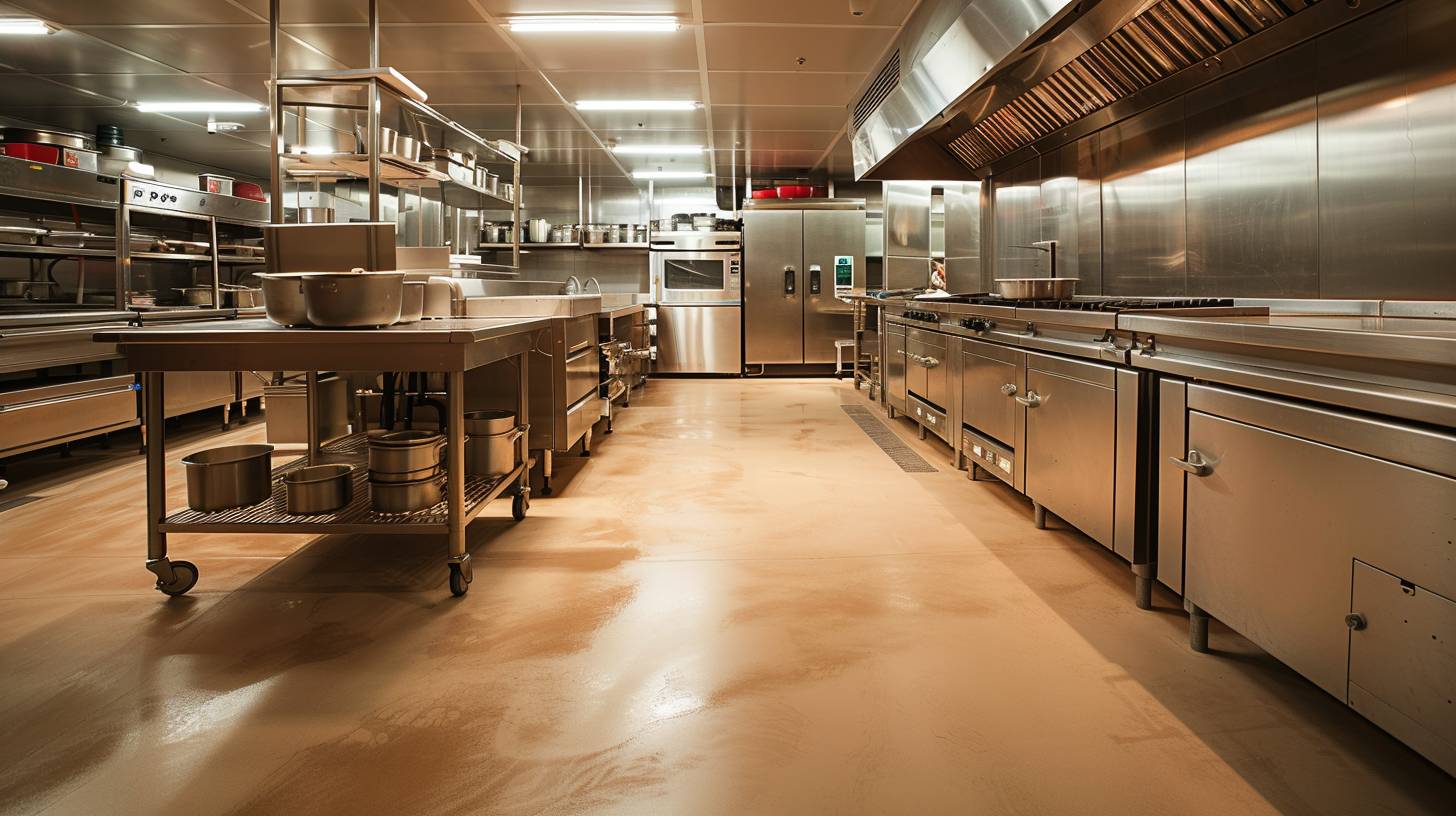Table of Contents [hide]
Busy kitchens punish floors with heat, steam, grease, water, and nonstop traffic. The right commercial kitchen flooring contractor helps you pick a seamless, slip-resistant flooring system that cleans fast and has thermal shock resistance, then installs it with proper surface preparation, slope to drains, and a timeline that fits your downtime.
In this guide, learn which systems work best, how to choose a flooring contractor wisely, and why good floors matter. Know which questions to ask local contractors and see maintenance tips so you open on schedule with a safe, durable floor your crew can trust.
Why Specialized Expertise Matters For Foodservice Environments
Food Safety and Compliance
Kitchen floors should support a hygienic environment and help you meet food safety standards. Seamless floors with coved bases reduce spots where bacteria, mold, and pathogens can hide. A good contractor understands local health expectations, targets the right slip resistance in wet zones, and designs details that make nightly cleaning faster.
Built for Heat, Impact, and Chemicals
Cooklines and dish areas see thermal cycling, dropped pans, and strong cleaners. Urethane cement coatings shine here because they tolerate thermal shock and heavy impact. Epoxy flooring with quartz or flake is a reliable choice for prep and service corridors when paired with the right topcoat.
Smart Drain and Wall Integration
Floors last longer when they connect cleanly to walls and drains. Look for coved base up the wall, stainless wall protection where needed, and clamping ring style drains that tie into the floor without weak grout lines. Proper detailing keeps spills and debris moving toward drains and prevents mold and mildew at edges.
The Risks Of Skipping Professional Guidance
Rising Maintenance Costs
Pick the wrong floor and it can stain, lose its shine, or peel after a few months of cleaning. The right system is matched to your traffic and the cleaners you use, so it stays looking good with less effort.
Safety Incidents And Lost Shifts
A floor that is too smooth gets slippery, and a poorly prepared surface can bubble or lift. Either problem can shut down a line or a whole room. Flooring pros set the right texture and make sure water drains away from work areas.
Premature Failure
Moisture under the slab and hot washdowns can ruin the wrong coating. Skipping basic moisture checks or using a product that cannot handle heat and steam leads to blisters and cracks that require costly replacement.
Commercial Kitchen Flooring Solutions
A back-of-house floor needs slip resistance, chemical resistance, and quick cleanup. Popular options include:
- Urethane cement systems near cooklines, dish areas, and walk-in cooler flooring where heat and cold cycle all day.
- Epoxy systems with quartz or flake broadcast in prep rooms and corridors for texture and durability.
- Quarry tile with epoxy grout in traditional kitchens that can commit to grout care.
- Polished concrete or decorative concrete in front-of-house, paired with mats and a strict cleaning routine.
Choosing The Right Commercial Kitchen Flooring Contractor
The right partner brings proof, options, and a clear plan. Look for three things:
Proven Foodservice Work
Ask for recent projects that look like yours. Photos should show coved base up the wall, clean drain tie-ins, and smooth transitions to adjacent floors.
System Versatility
Your kitchen has zones with different needs. Look for a team that offers urethane floors, epoxy coatings, rubber flooring, and tile options, then matches each zone to the right floor finishes through careful material selection.
Process and Scheduling
Expect written steps for prep and repair, moisture checks, and quality checkpoints between coats. Crews should protect equipment and phase work after hours or during slow periods so you stay open.
Local Know-How
Teams that understand health inspections, delivery windows, and peak service can phase work around you and respond quickly to repairs or expansions. Ask how many kitchens they have done within 25 miles in the last 12 months and request two recent references.
Questions To Ask Before You Sign
- Which system do you recommend for cookline, dish, and walk-in areas, and why?
- How will you prep the surface and check for moisture, and what is the plan if readings are high?
- What slip resistance target will you meet in wet and greasy zones, and how will you verify it?
How will the base up the wall, drains, and wall protection be detailed for a seamless finish? - How long will each phase take, and when can each area reopen?
- Which cleaners are approved, what will upkeep cost, and what warranties apply?
TIP: Put these answers in the contract so expectations are clear.
FAQs About Commercial Kitchen Flooring Contractors
How long does installation take?
Many kitchens finish in phases over two to four nights. Urethane cement often allows faster return to service than traditional epoxy builds.
Which system provides the best slip resistance?
Quartz broadcast urethane cement and designated safety flooring products deliver dependable traction. Texture can be tuned to balance cleanability and grip.
Do we really need moisture testing?
Yes. Moisture and pH affect adhesion. If readings are high, your contractor will include mitigation to protect the bond. See ASTM F2170 basics for what the RH number means and how tests are done on-site.
Can repairs be done without closing the kitchen?
Often yes. Crews isolate a zone, prep, install, and cure with fast-setting coats while the rest of the kitchen keeps working.
What does maintenance look like?
Follow the manufacturer’s guide. Most systems use neutral cleaners and scheduled scrubbing. Avoid harsh acids unless the floor is rated for chemical exposure.
Find The Right Commercial Kitchen Flooring Contractors Near You
The right partner designs floors by zone, prepares the slab correctly, and works on a schedule that respects service. Share your menu, cleaning routine, and traffic patterns to set clear priorities.
Ask for written scopes that explain each step. Review timelines, slip resistance targets, cure times, maintenance plans, and warranties. Choose the team that keeps your kitchen clean, compliant, and open.
Work with Mr. Remodel to meet vetted local contractors, compare itemized proposals, and match each zone to the right system. Submit your project today, and get quotes from commercial kitchen flooring contractors who will line up competitive bids you can trust.





